外研版高中必修二Module3 Music---Languague Points课件(共74张PPT)
文档属性
| 名称 | 外研版高中必修二Module3 Music---Languague Points课件(共74张PPT) | 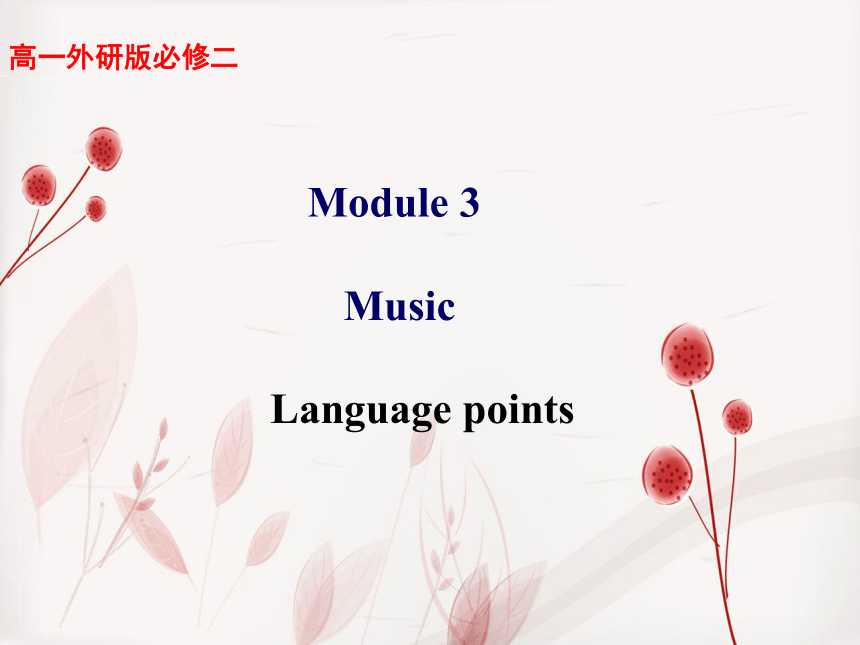 | |
| 格式 | zip | ||
| 文件大小 | 766.5KB | ||
| 资源类型 | 教案 | ||
| 版本资源 | 外研版 | ||
| 科目 | 英语 | ||
| 更新时间 | 2021-06-17 17:13:30 | ||
图片预览

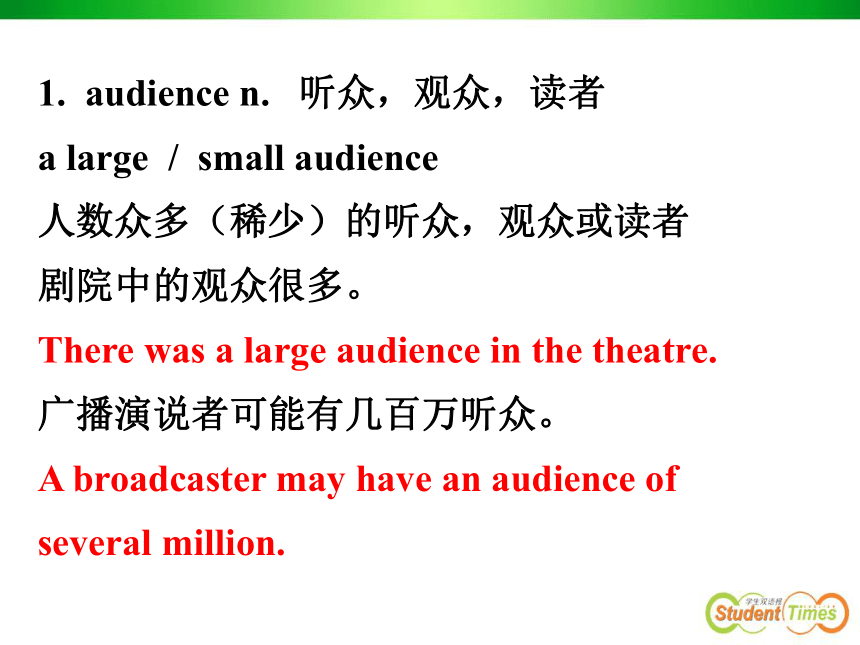


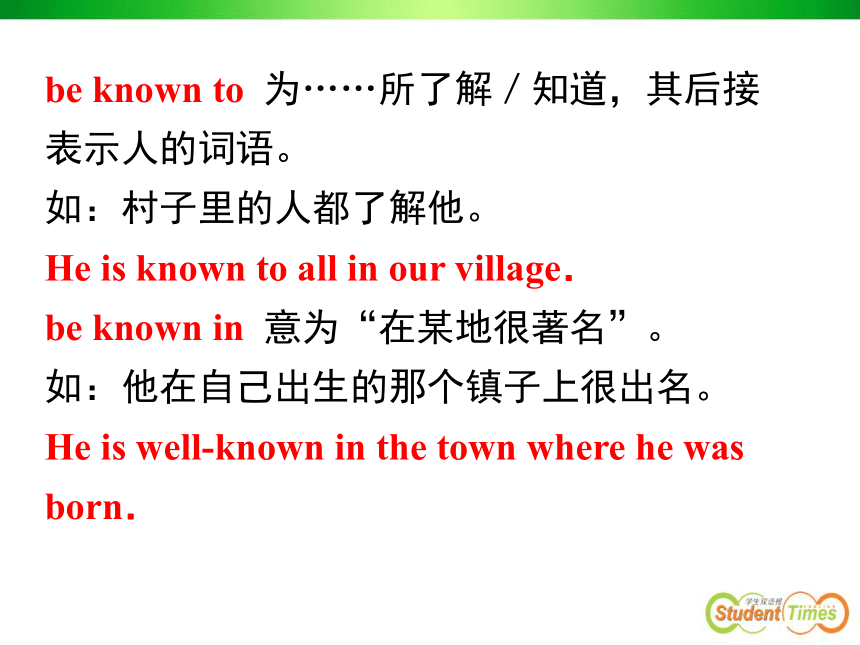
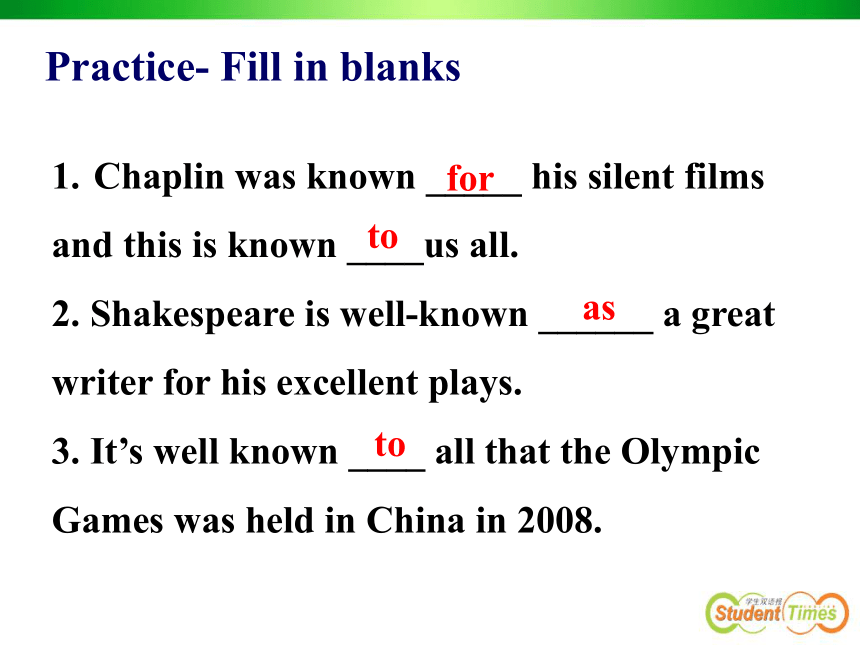

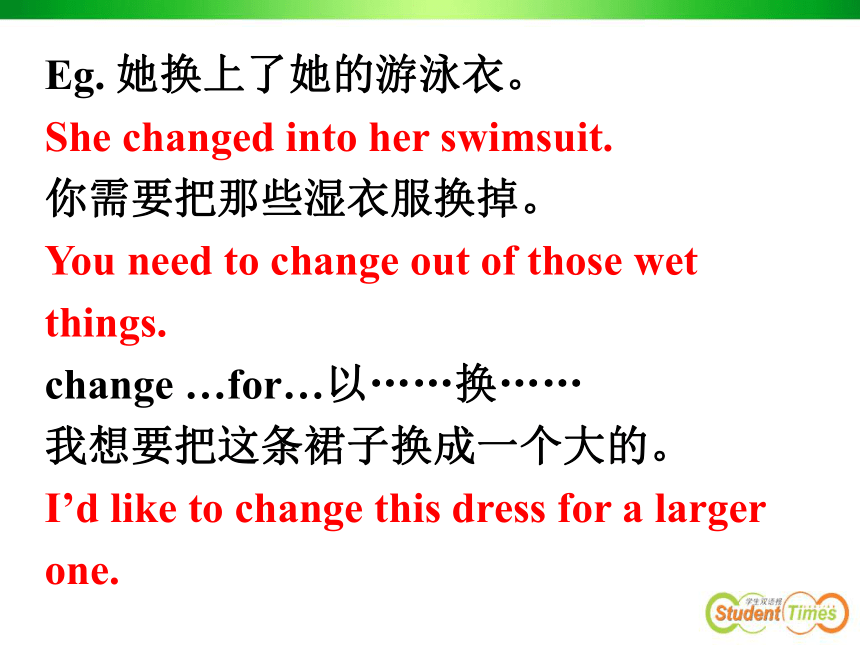
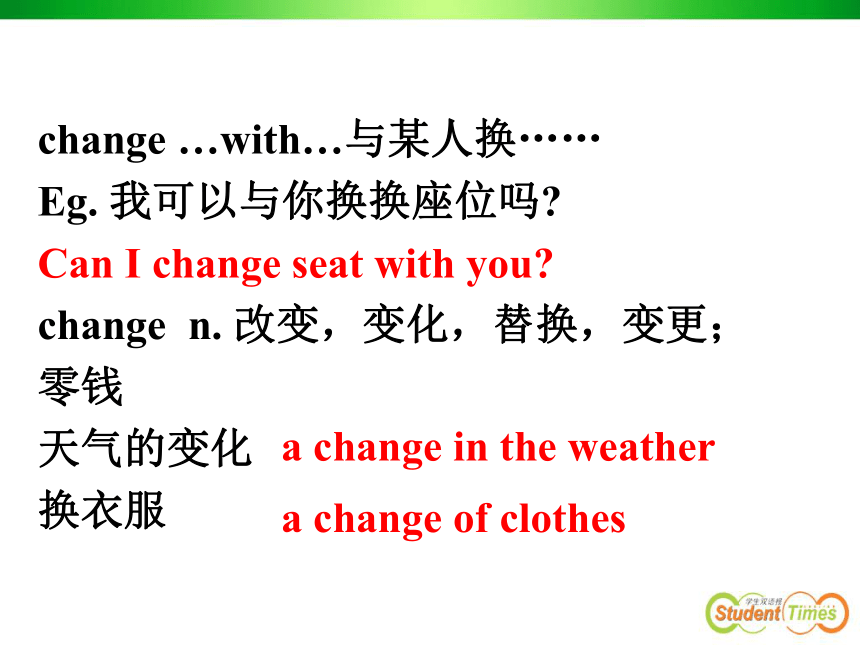
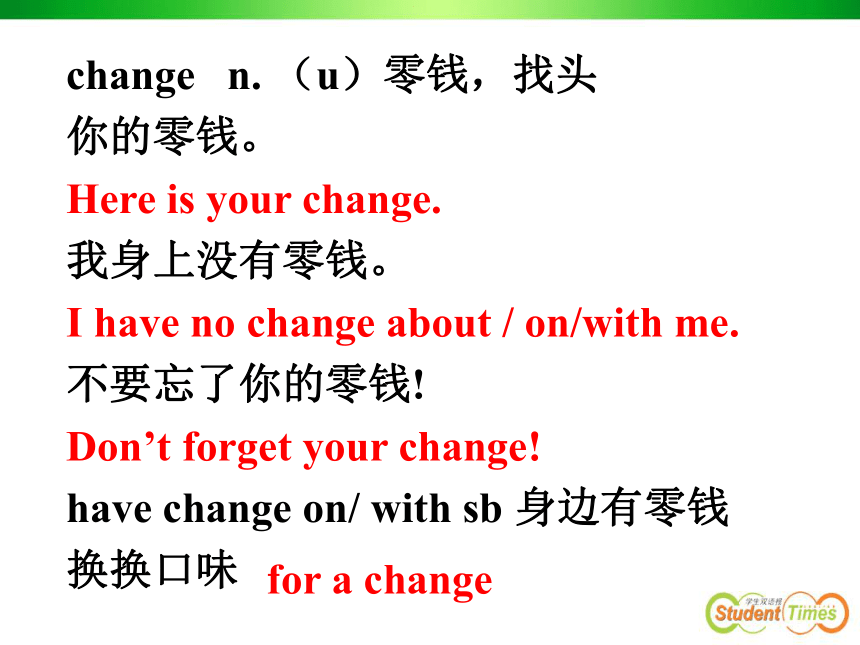
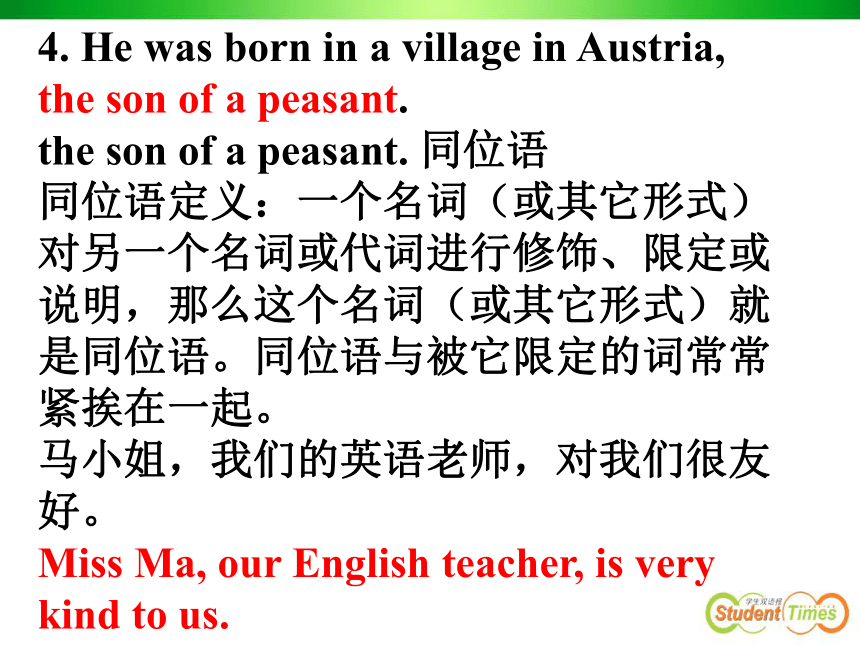
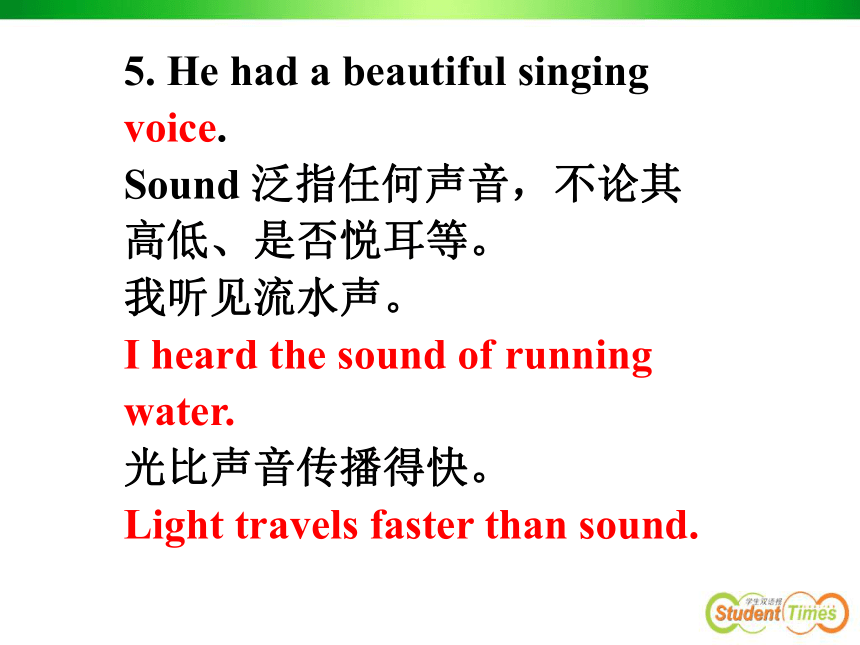
文档简介
(共74张PPT)
Module
3
Music
Language
points
高一外研版必修二
1.
audience
n.
听众,观众,读者
a
large
/
small
audience
人数众多(稀少)的听众,观众或读者
剧院中的观众很多。
There
was
a
large
audience
in
the
theatre.
广播演说者可能有几百万听众。
A
broadcaster
may
have
an
audience
of
several
million.
2.
Joseph
Haydn
was
an
Austrian
composer
and
is
known
as
“the
father
of
the
symphony”
be
known
as,
be
known
for,
be
known
to,
be
known
in
be
known
as
作为……而著名,其后的
名词表
示的身份、职业等。
如:他作为一个著名歌手而出名。
He
is
known
as
a
famous
singer.
我们相信你会成为一位著名的画家。
We’re
sure
you’ll
be
well-known
as
an
artist.
be
known
for
因……而著名,接表示某人或物
特点、特长等的内容。如:
桂林因其美丽的山水而闻名。
Guilin
is
known
for
her
beautiful
mountains
and
rivers.
他因在同一天组织两场大型的流行音乐会而
出名。
He
is
well-known
for
organizing
two
big
pop
concerts
on
the
same
day.
be
known
to
为……所了解/知道,其后接
表示人的词语。
如:村子里的人都了解他。
He
is
known
to
all
in
our
village.
be
known
in
意为“在某地很著名”。
如:他在自己出生的那个镇子上很出名。
He
is
well-known
in
the
town
where
he
was
born.
Chaplin
was
known
_____
his
silent
films
and
this
is
known
____us
all.
2.
Shakespeare
is
well-known
______
a
great
writer
for
his
excellent
plays.
3.
It’s
well
known
____
all
that
the
Olympic
Games
was
held
in
China
in
2008.
Practice-
Fill
in
blanks
for
to
as
to
3.
Other
composers
had
written
symphonies
before
Hayden,
but
he
changed
the
symphony
into
a
long
piece
for
a
large
orchestra.
change…into
把……换成……
把教室换成(装修成)卧室。
Change
the
classroom
into
a
bedroom.
把英语翻译成汉语。
Change
English
into
Chinese.
change
into
+
衣服
换上……衣服
change
out
of
+衣服
换掉……衣服
Eg.
她换上了她的游泳衣。
She
changed
into
her
swimsuit.
你需要把那些湿衣服换掉。
You
need
to
change
out
of
those
wet
things.
change
…for…以……换……
我想要把这条裙子换成一个大的。
I’d
like
to
change
this
dress
for
a
larger
one.
change
…with…与某人换……
Eg.
我可以与你换换座位吗?
Can
I
change
seat
with
you?
change
n.
改变,变化,替换,变更;
零钱
天气的变化
换衣服
a
change
in
the
weather
a
change
of
clothes
change
n.
(u)零钱,找头
你的零钱。
Here
is
your
change.
我身上没有零钱。
I
have
no
change
about
/
on/with
me.
不要忘了你的零钱!
Don’t
forget
your
change!
have
change
on/
with
sb
身边有零钱
换换口味
for
a
change
4.
He
was
born
in
a
village
in
Austria,
the
son
of
a
peasant.
the
son
of
a
peasant.
同位语
同位语定义:一个名词(或其它形式)对另一个名词或代词进行修饰、限定或说明,那么这个名词(或其它形式)就是同位语。同位语与被它限定的词常常紧挨在一起。
马小姐,我们的英语老师,对我们很友好。
Miss
Ma,
our
English
teacher,
is
very
kind
to
us.
5.
He
had
a
beautiful
singing
voice.
Sound
泛指任何声音,不论其高低、是否悦耳等。
我听见流水声。
I
heard
the
sound
of
running
water.
光比声音传播得快。
Light
travels
faster
than
sound.
noise表示“噪音、喧闹”,指的是人们不愿听到的声音或嘈杂声。它可以作可数名词,也可以用作不可数名词。
如:昨夜我听见一些奇怪的响声。
I
heard
some
strange
noises
last
night.
这个地方人声嘈杂。
There’s
a
lot
of
noise
here.
voice
用于人时,指说话、歌唱或发笑的声音,也可指发言权。用于其它方面时,常含悦耳之声,如鸟鸣声,乐器声音等。
请大声说。
Please
speak
in
a
louder
voice.
6.
After
studying
music
in
Vienna,
Haydn
went
to
work
at
the
court
of
a
prince
in
eastern
Austria,
where
he
became
director
of
music.
After
studying
music
in
Vienna…
=After
he
studied
music
in
Vienna…
=Having
studied
music
in
Vienna…
court
n.
庭院,法庭,球场
empire
n.
帝国
emperor
n.
皇帝
empress
n.
女皇,皇后
prince
n.
王子,
亲王
princess
n.
公主,王妃
director
of
music
音乐指挥。director表示职位,不加冠词。英语中表示职位,头衔的名词,用作表语、同位语、补足语时,不加冠词。
如:Clinton
was
elected
______
president
for
the
second
time.
A.
/
B.
the
C.
a
D.
our
注意:如果这类名词在句中作主语,需要加冠词。
总统做了电视讲话。
The
president
gave
a
speech
on
TV.
A
7.
Having
worked
there
for
30
years,
He
moved
to
London,
where
he
became
very
successful.
Having
done…
做时间状语
现在分词的完成式作状语,
表示的动作发生在谓语动词的动作之前。
Having
worked
there
for
30
years…
=
After
Haydn
had
worked
there
for
30
years…
读过信之后,她非常激动。
Having
read
the
letter,
she
got
very
excited.
在这家工厂工作时,他从工人那里学到了很多。
Working
in
the
factory,
he
learned
a
lot
from
the
workers.
注意:现在分词的一般式表示动作与谓语动词的动作同时发生。
规则:现在分词作时间状语:
如果分词所表示的动作和谓语的动作
同时发生或几乎同时发生,
用现在分词的一般式。如果分词动作
明显在谓语之前发生,用现分完成式。
没收到他的回信,她就又给她写了一封。
Not
having
heard
from
him,
she
wrote
to
him
again.
successful
adj.
成功的
success
n.
成功,成就,胜利
succeed
v.成功,胜利,
继承,接着发生
完全成功
获得成功
enjoy/get/gain/win/achieve/attain
(a)
success
succeed
in
(doing)
sth
成功做某事
Eg.
他成功的通过了考试.
He
succeed
in
(passing)
the
exam.
completely
successful
谁将继承这份财产?
Who
will
succeed
to
the
estate?
他继他父亲之后做了这家商店的经理。
He
will
succeed
his
father
as
manager
of
the
shop.
fail
v.
失败
failure
n.失败
8.
Wolfgang
Amadeus
Mozart
was
a
composer,
possibly
the
greatest
musical
genius
of
all
time.
time
固定搭配
(1)
ahead
of
time
提前
(2)
all
the
time
一直,始终
(3)
at
a
time
每次/一次
(4)
at
one
time
曾经;一度
(5)
at
the
same
time
同时;然而
(6)
at
times
有时
(7)
behind
time
不及时,晚点
(8)
behind
the
times
过时
(9)
from
time
to
time
有时,间或
(10)
have
a
good
/
hard
time
过得很好
/
处境
困难
(11)
in
one’s
spare
time
在业余时间
(12)
in
a
short
time
不久
(13)
in
time
及时;迟早
(14)
kill
time
消磨时间
(15)
many
a
time
时常,多次
(16)
on
time
准时
(17)
take
one’s
time
从容;慢慢来
(18)
time
and
time
again
多次,不断地
(19)
for
the
time
being
暂时
9.
He
only
lived
35
years
and
he
composed
more
than
600
pieces
of
music.
more
than的用法
A.
“more
than+名词”表示“:不仅仅
詹森不仅仅是一个讲演者,他还是一个作家。
Jason
is
more
than
a
lecturer;
he
is
a
writer,
too.
B.
“more
than+数词”含“以上”或“不止”之意,如:
我已经认识大卫20多年了
I
have
known
David
for
more
than
20
years.
C.
“more
than+形容词”等于“很”或“非常”的意思,如:
她对这个结果非常满意。
She
is
more
than
pleased
with
the
result.
D.
more
than
+从句
表示超出某人力量范围
那是我所不能及的。
That
is
more
than
I
can
do.
piece
n.(文艺作品的)篇,首,幅
一首诗
a
piece
of
poetry
一幅雪景图
a
snow
piece
10.
Wolfgang
had
musical
talent
from
a
very
early
age.
沃尔夫冈很小便有音乐天赋。
talent
n.才能,才干;天才,天资(与介词for连用)talented
adj.
有才能的;天才的
(1)
这个小女孩从小就具有语言天赋。
The
little
girl
had
a
talent
for
languages
from
a
very
early
age.
(2)
有才能的人
a
man
of
talent
比较:genius/talent
genius指“天才”,语气强烈,表示最高的、最全面的、最富于创造性的才能,即天赋。talent
较着重“特殊才能”,一般不用复数。例如:
这个小女孩具有舞蹈才能。
The
little
girl
has
a
talent
for
dancing.
莎士比亚是一个文学天才。
Shakespeare
was
a
genius
in
literature.
11.
He
started
composing
music
when
he
was
five,
and
when
he
was
six,
he
played
the
harpsicord
in
a
concert
for
the
Empress
of
Austria.
start
/
begin
to
do
=start
/begin
doing
start/begin
用
to
do
不用doing的情况:
主语为物
It
began
to
rain.
天开始下雨了。
(2)
start/begin
本身用了进行时
He
was
starting
to
think
about
it.
他开始想这件事了。
(3)
start/begin
后有realize,know,
understand
等表心理活动的词时。
They
started
to
realize
theirs
mistakes.
他们开始意识到他们的错误了。
12.
By
the
time
he
was
14,
Mozart
had
composed
many
pieces
for
the
harpsichord,
piano
and
violin,
as
well
as
for
orchestras.
time常用句型
(1)
It’s
time
for
sth.
是做……的时候了。
该吃晚饭了。
It’s
time
for
supper.
(2)
It’s
time
(for
sb.)
to
do
sth.
是(某人)该干……的时候了。
我们该吃晚饭了。
It’s
time
for
us
to
have
supper.??
(3)
It’s
(high)
time
+
that
从句
(that可以省略,从句谓语动词用虚拟语气)是某人(早)该干某事的时候了。
我们早该吃晚饭了。
It’s
(high)
time
that
we
had
supper.?
(4)
It
(this
/that)
is
the
first
(second,
third
…)
time
+
that
从句(从句要用现在完成时)。这(那)是某人第一(二、三……)次干某事。如主句谓语动词是过
去时,则
that
从句要用过去完成时。
这是我们第二次在这家饭店吃饭了。
It
was
the
second
time
that
we
had
had
supper
in
this
restaurant.
?
(5)
by
the
time引导的时间状语从句。若从句用一般现在时,主句要用将来完成时;若从句是一般过去时,主句要用过去完成时。
他二十岁时,他已经从大学毕业了。
By
the
time
he
was
twenty,
he
had
graduated
from
college.?
(6)
each
time(每次),next
time(下次),
any
time(任何时候)等词组引导的时间状语从句。
下一次你到我家来我讲给你看我最新的作品。
Next
time
you
come
to
my
home,
I’ll
show
you
my
latest
works.
(1)
I
thought
her
nice
and
honest
_____
I
met
her.
A.
first
time????
B.
the
first
time
C.
for
the
first
time??
D.
in
time
(2)
By
the
time
you
get
to
San
Francisco
tomorrow,
I
______
for
Southeast
Asia.
A.
shall
have
left??
B.
am
leaving
C.
will
leave??????????
D.
have
already
left
B
D
关于time的练习
(3)
Don’t
try
to
do
everything
at
Once;
take
it
a
bit
______.
A.
at
one
time?????
B.
by
one
time
C.
one
for
each
time??????
D.
at
a
time
(4)
If
Father
had
returned
on
the
Christmas,
we
would
have
had
______.
the
happiest
time????
B.
a
more
happier
time
C.
much
happiest
time?????
D.
a
much
happier
time
D
D
(5)
By
the
time
this
letter
reaches
you,
I
____
the
country.
have
left
B.
will
have
left
C.
will
leave
D.
had
left
(6)
By
the
time
he
was
twelve,
Edison
_________a
chemistry
lab
for
himself.
has
built
B.
had
built
C.
will
have
built
D.
have
built
B
B
as
well
as
不仅,相当于not
only.
用法:该词组为连词,作:同;和;也“讲”
时,连接同等并列成分。连接两个主语时,谓语动词采用就远原则。
不但莉莉的父母,而且连莉莉也非常喜欢古典音乐。
Lily
as
well
as
her
parents
is
very
fond
of
classical
music.
辩析:as
well
as/not
only…but
also;都有“不但……而且”之意,均连接同等并列成分但
as
well
as
强调的是前项,not
only…
but
also
强调的是后项;连接两个主语时,as
well
as
中的谓语动词采用就远原则,not
only…but
also
中的谓语动词采用就近原则。
又如:我们不但白天旅行,而且晚上也旅行。
We
should
travel
by
night
as
well
as
by
day.
我们不但白天旅行,而且晚上也旅行。
We
shall
travel
not
only
by
day
but
also
by
night.
as
well
as和as
well都有“也;还”之意,
但是as
well
as是连词,连接两个并列成
分;as
well是副词,意为“又;另外也”,其后不跟什么成分。
把那些也给我吧。
Give
me
those
as
well.
as
well
as
除了以上的用法,还有我们最熟悉的另一种用法,即用于比较状语从句,意思是“和……一样好”。
如:你开车和他开得一样好。
You
drive
as
well
as
he
does.
约翰足球踢得即使不比大卫好,也得和他一样好。
John
plays
football
as
well
as,
if
not
better
than,
David.
13.
Hayden
met
Mozart
in
1781
and
was
very
impressed
with
him.
impress
vi/
vt
打动,给…留下印象
她的话深深地打动了我。
Her
words
deeply
impressed
me.
impress
sth
on
sb
impress
sb
with
sth
她的幽默感给我们流下了深刻的印象。
She
impressed
her
sense
of
humor
on
us.
She
impressed
us
with
her
sense
of
humor.
>
用……打动某人
他的话铭刻在我的记忆里。
His
words
are
strongly
impressed
on
my
memory.
他们对姑娘的幽默感留下深刻印象。
The
girl
impressed
them
with
her
sense
of
humour.
14.
While
he
was
still
a
teenager,
Mozart
was
already
a
big
star
and
toured
Europe
giving
concerts.
周游世界
tour
the
world
这出戏将在金秋在农村巡回演出。
The
play
will
tour
the
countryside
in
the
autumn.
n.
游历,观光
做环球旅行
make
a
round–the–world
tour
15.
It
was
Haydn
who
encouraged
Beethoven
to
move
to
Vienna.
强调句型的用法
1.
在英语中,我们常用It
is/was…
who/that结构来突出强调句子的某一成分
(一般是句子中主语,宾语或状语)。在这个句型中,it没有词汇意义,只是引出被强调的成分。如果被强调的成分是表示人的词,用who或that来连接都可以。如果是其它成分,则一律用that来连接。
例如:正是我母亲每天做饭。
It
is
my
mother
who/that
cooks
every
day.
正是昨天汤姆才通过的考试。
It
was
yesterday
that
Tom
passed
in
the
maths
exam.
2.
被强调成分是主语,who/that
之后的谓语动词应该在人称和数上
与原句中的主语保持一致。
e.g.
It
is
I
who
am
right.
e.g.
It
is
he
who
is
wrong.
3.
即使被强调成分是句子中的时间状
语,地点状语,原因状语等,也不能
用when,where,
because,要用
that。
例如:直到战争结束以后爱因斯坦才
能够重新继续研究工作。
It
was
after
the
war
was
over
that
Einstein
was
able
to
come
back
to
his
research
work
again
.
那位老妇人恰恰是在银行前面被
抢劫的。
It
was
in
front
of
the
bank
that
the
old
lady
was
robbed.
正是因为大雨他才来晚了。
It
was
because
of
the
heavy
rain
that
he
came
late.
4.
如果被强调的成分有同位语,
同位语也应提前。
正是从他,他的化学老师那里
Paul
学会了仔细观察。
It
was
from
him,
his
chemistry
Teacher,
that
Paul
learned
to
watch
carefully
in
class.
5.
区分定语从句和强调句型,如果去掉
it
is/
was
...that句子仍然通顺成立,则
为强调句型,不成立不通顺,则为定语
从句。
例如:正是三年前他去美国进修的。
It
was
three
years
ago
that
he
went
to
American
for
a
further
study.
去掉
It
was
that
句子为
Three
years
ago
he
went
to
America
for
a
further
study.句子通顺,意思完整,那么,这
就是一个强调句型。
注意:
(1)
强调时间、地点、原因状语时,
通常只使用that,而不能使用when,
where,
why。
①
It
was
only
when
I
reread
his
poems
recently
________I
began
to
appreciate
their
beauty.
until B.
that
C.
when D.
so
B
②
It
was
in
Qingdao________I
saw
the
sea
for
the
first
time.
what B.
that
C.
when D.
which
③
It
was
because
of
bad
weather
_____
the
football
match
had
to
be
put
off.
so
B.
so
that
C.
why
D.
that
B
D
以上三题均为强调句型,分别强调时间
状语
(only
when
I
reread
his
poems
recently)、地点状语(in
Qingdao)和原因
状语(because
of
bad
weather),
均只能使
用that。
(2)当被强调的是not...until句型时,应将
not
置于until之前,主句由否定句改为肯
定句。
①
It
was
not
until
1920
________regular
radio
broadcast
began.
while
B.
which C.
that
D.
since
C
(3)
强调主语时,谓语动词应与之保持一致。
【误】
It
is
I
who/
that
is
going
to
be
sent
there
to
help
them.
【正】
It
is
I
who/
that
am
going
to
be
sent
there
to
help
them.
(4)
强调主语或宾语且其为人称代词时,
应
注意其形式仍用主格或宾格形式。
【误】It
was
her
that
told
me
about
it.
【正】It
was
she
that
told
me
about
it.
【误】It
is
I
who
the
teacher
has
punished.
【正】It
is
me
whom
the
teacher
has
punished.
反馈练习
It
is
the
ability
to
do
the
job,
not
where
you
come
from
or
what
you
are
________
matters.
A.
one
B.
that
C.
what
D.
it
(2)
It
was
not
________
she
took
off
her
dark
glasses
________
I
realized
she
was
a
famous
film
star.
when;
that
B.
until;
that
C.
until;
when
D.
when;
then
B
B
(3)
It
was
with
great
joy
___
he
received
the
news
that
his
lost
daughter
had
been
found.
A.
because
B.
which
C.
since
D.
that
D
(4)
She
did
quite
well
in
her
written
papers;
it
was
in
the
oral
examination
___
she
fell
down.
A.
who
B.
whom
C.
that
D.
why
C
(5)
--___that
he
managed
to
get
the
information?
--Oh,
a
friend
of
his
helped
him.
A.
Where
was
it
B.
What
was
it
C.
How
was
it
D.
Why
was
it
C
(6)
Why!
I
have
nothing
to
confess.
___
you
want
me
to
say?
A.
What
is
it
B.
What
it
is
C.
How
is
it
D.
How
it
is
A
(7)
He
is
a
man
of
few
words.
It
is
only
after
he
had
a
few
drinks
___
he
can
open
up.
A.
when
B.
as
C.
that
D.
which
C
16.
Beethoven
became
very
popular
in
the
Austrian
capital
and
stayed
there
for
the
rest
of
his
life.
(1)
popular
adj.
流行的,受欢迎的
a
popular
song
一首流行歌曲
a
popular
teacher
一位受欢迎的老师
sb./sth
be
popular
with
sb...
受某人欢迎
sb./sth
be
popular
in+
地点…
在某地受欢迎
足球在全世界很受欢迎。
Football
is
popular
with
people
all
over
the
world.
足球在中国是一个受欢迎的运动。
Football
is
a
popular
game
in
China.
(2)
rest
n.
剩余的人(物),做主语时,动词数的形式取决于它的具体所指。
我拿走了一些钱,剩下的是你的。
I
take
some
money
and
the
rest
is
yours.
一些学生去踢足球了,剩余的在教室里学习。
Some
students
went
to
play
football
and
the
rest
are
studying
in
the
classroom.
17.
As
he
grew
older,
he
began
to
go
deaf.
go
+adj.往往表示事物由好向坏的变化。
类似的用法:
go
deaf
变聋
go
mad
变疯
go
wrong
变坏(出毛病)go
bad
变坏(变质)
go
hungry
变饿
go
blind
变瞎
当我向他提及此事时,他的脸红了。
她的头发正在变白。
Her
hair
is
going
gray.
When
I
mentioned
it
to
him,
his
face
went
red.
Practice
It
is
known
to
all______
the
theme
of
the
2010
World
Expo
is
“Better
city,
Better
life.”
that
B.
what
C.
which
D.
when
2.
It
is
along
the
Mississippi
River
____
Mark
Twain
spent
much
of
his
childhood.
A.
how
B.
which
C.
that
D.
where
A
C
3.
Peter
has
a/an
______
for
making
a
difficult
subject
understandable
and
interesting.
A.
knowledge
B.
ability
C.
talent
D.
skill
C
4.
Tom
was
deeply
_____
by
the
story
of
the
hero.
Which
of
the
following
is
not
right?
impressed
B.
moved
C.
pressed
D.
struck
5.
He
is
popular
_____
young
people
because
he
is
known
______
the
king
of
the
rock.
with,
for
B.
with,
as
C.
to,
as
D.
to,
for
C
B
6.
Hearing
the
bad
news,
he
_____
mad.
goes
B.
went
C.
has
gone
D.
has
become
7.
Fish
soon
_____
in
hot
weather.
goes
badly
B.
is
gone
bad
C.
goes
bad
D.
is
badly
gone
8.
They
changed
their
blue
shirts
____
white
ones.
A.
from
B.
with
C.
into
D.
for
B
C
D
Module
3
Music
Language
points
高一外研版必修二
1.
audience
n.
听众,观众,读者
a
large
/
small
audience
人数众多(稀少)的听众,观众或读者
剧院中的观众很多。
There
was
a
large
audience
in
the
theatre.
广播演说者可能有几百万听众。
A
broadcaster
may
have
an
audience
of
several
million.
2.
Joseph
Haydn
was
an
Austrian
composer
and
is
known
as
“the
father
of
the
symphony”
be
known
as,
be
known
for,
be
known
to,
be
known
in
be
known
as
作为……而著名,其后的
名词表
示的身份、职业等。
如:他作为一个著名歌手而出名。
He
is
known
as
a
famous
singer.
我们相信你会成为一位著名的画家。
We’re
sure
you’ll
be
well-known
as
an
artist.
be
known
for
因……而著名,接表示某人或物
特点、特长等的内容。如:
桂林因其美丽的山水而闻名。
Guilin
is
known
for
her
beautiful
mountains
and
rivers.
他因在同一天组织两场大型的流行音乐会而
出名。
He
is
well-known
for
organizing
two
big
pop
concerts
on
the
same
day.
be
known
to
为……所了解/知道,其后接
表示人的词语。
如:村子里的人都了解他。
He
is
known
to
all
in
our
village.
be
known
in
意为“在某地很著名”。
如:他在自己出生的那个镇子上很出名。
He
is
well-known
in
the
town
where
he
was
born.
Chaplin
was
known
_____
his
silent
films
and
this
is
known
____us
all.
2.
Shakespeare
is
well-known
______
a
great
writer
for
his
excellent
plays.
3.
It’s
well
known
____
all
that
the
Olympic
Games
was
held
in
China
in
2008.
Practice-
Fill
in
blanks
for
to
as
to
3.
Other
composers
had
written
symphonies
before
Hayden,
but
he
changed
the
symphony
into
a
long
piece
for
a
large
orchestra.
change…into
把……换成……
把教室换成(装修成)卧室。
Change
the
classroom
into
a
bedroom.
把英语翻译成汉语。
Change
English
into
Chinese.
change
into
+
衣服
换上……衣服
change
out
of
+衣服
换掉……衣服
Eg.
她换上了她的游泳衣。
She
changed
into
her
swimsuit.
你需要把那些湿衣服换掉。
You
need
to
change
out
of
those
wet
things.
change
…for…以……换……
我想要把这条裙子换成一个大的。
I’d
like
to
change
this
dress
for
a
larger
one.
change
…with…与某人换……
Eg.
我可以与你换换座位吗?
Can
I
change
seat
with
you?
change
n.
改变,变化,替换,变更;
零钱
天气的变化
换衣服
a
change
in
the
weather
a
change
of
clothes
change
n.
(u)零钱,找头
你的零钱。
Here
is
your
change.
我身上没有零钱。
I
have
no
change
about
/
on/with
me.
不要忘了你的零钱!
Don’t
forget
your
change!
have
change
on/
with
sb
身边有零钱
换换口味
for
a
change
4.
He
was
born
in
a
village
in
Austria,
the
son
of
a
peasant.
the
son
of
a
peasant.
同位语
同位语定义:一个名词(或其它形式)对另一个名词或代词进行修饰、限定或说明,那么这个名词(或其它形式)就是同位语。同位语与被它限定的词常常紧挨在一起。
马小姐,我们的英语老师,对我们很友好。
Miss
Ma,
our
English
teacher,
is
very
kind
to
us.
5.
He
had
a
beautiful
singing
voice.
Sound
泛指任何声音,不论其高低、是否悦耳等。
我听见流水声。
I
heard
the
sound
of
running
water.
光比声音传播得快。
Light
travels
faster
than
sound.
noise表示“噪音、喧闹”,指的是人们不愿听到的声音或嘈杂声。它可以作可数名词,也可以用作不可数名词。
如:昨夜我听见一些奇怪的响声。
I
heard
some
strange
noises
last
night.
这个地方人声嘈杂。
There’s
a
lot
of
noise
here.
voice
用于人时,指说话、歌唱或发笑的声音,也可指发言权。用于其它方面时,常含悦耳之声,如鸟鸣声,乐器声音等。
请大声说。
Please
speak
in
a
louder
voice.
6.
After
studying
music
in
Vienna,
Haydn
went
to
work
at
the
court
of
a
prince
in
eastern
Austria,
where
he
became
director
of
music.
After
studying
music
in
Vienna…
=After
he
studied
music
in
Vienna…
=Having
studied
music
in
Vienna…
court
n.
庭院,法庭,球场
empire
n.
帝国
emperor
n.
皇帝
empress
n.
女皇,皇后
prince
n.
王子,
亲王
princess
n.
公主,王妃
director
of
music
音乐指挥。director表示职位,不加冠词。英语中表示职位,头衔的名词,用作表语、同位语、补足语时,不加冠词。
如:Clinton
was
elected
______
president
for
the
second
time.
A.
/
B.
the
C.
a
D.
our
注意:如果这类名词在句中作主语,需要加冠词。
总统做了电视讲话。
The
president
gave
a
speech
on
TV.
A
7.
Having
worked
there
for
30
years,
He
moved
to
London,
where
he
became
very
successful.
Having
done…
做时间状语
现在分词的完成式作状语,
表示的动作发生在谓语动词的动作之前。
Having
worked
there
for
30
years…
=
After
Haydn
had
worked
there
for
30
years…
读过信之后,她非常激动。
Having
read
the
letter,
she
got
very
excited.
在这家工厂工作时,他从工人那里学到了很多。
Working
in
the
factory,
he
learned
a
lot
from
the
workers.
注意:现在分词的一般式表示动作与谓语动词的动作同时发生。
规则:现在分词作时间状语:
如果分词所表示的动作和谓语的动作
同时发生或几乎同时发生,
用现在分词的一般式。如果分词动作
明显在谓语之前发生,用现分完成式。
没收到他的回信,她就又给她写了一封。
Not
having
heard
from
him,
she
wrote
to
him
again.
successful
adj.
成功的
success
n.
成功,成就,胜利
succeed
v.成功,胜利,
继承,接着发生
完全成功
获得成功
enjoy/get/gain/win/achieve/attain
(a)
success
succeed
in
(doing)
sth
成功做某事
Eg.
他成功的通过了考试.
He
succeed
in
(passing)
the
exam.
completely
successful
谁将继承这份财产?
Who
will
succeed
to
the
estate?
他继他父亲之后做了这家商店的经理。
He
will
succeed
his
father
as
manager
of
the
shop.
fail
v.
失败
failure
n.失败
8.
Wolfgang
Amadeus
Mozart
was
a
composer,
possibly
the
greatest
musical
genius
of
all
time.
time
固定搭配
(1)
ahead
of
time
提前
(2)
all
the
time
一直,始终
(3)
at
a
time
每次/一次
(4)
at
one
time
曾经;一度
(5)
at
the
same
time
同时;然而
(6)
at
times
有时
(7)
behind
time
不及时,晚点
(8)
behind
the
times
过时
(9)
from
time
to
time
有时,间或
(10)
have
a
good
/
hard
time
过得很好
/
处境
困难
(11)
in
one’s
spare
time
在业余时间
(12)
in
a
short
time
不久
(13)
in
time
及时;迟早
(14)
kill
time
消磨时间
(15)
many
a
time
时常,多次
(16)
on
time
准时
(17)
take
one’s
time
从容;慢慢来
(18)
time
and
time
again
多次,不断地
(19)
for
the
time
being
暂时
9.
He
only
lived
35
years
and
he
composed
more
than
600
pieces
of
music.
more
than的用法
A.
“more
than+名词”表示“:不仅仅
詹森不仅仅是一个讲演者,他还是一个作家。
Jason
is
more
than
a
lecturer;
he
is
a
writer,
too.
B.
“more
than+数词”含“以上”或“不止”之意,如:
我已经认识大卫20多年了
I
have
known
David
for
more
than
20
years.
C.
“more
than+形容词”等于“很”或“非常”的意思,如:
她对这个结果非常满意。
She
is
more
than
pleased
with
the
result.
D.
more
than
+从句
表示超出某人力量范围
那是我所不能及的。
That
is
more
than
I
can
do.
piece
n.(文艺作品的)篇,首,幅
一首诗
a
piece
of
poetry
一幅雪景图
a
snow
piece
10.
Wolfgang
had
musical
talent
from
a
very
early
age.
沃尔夫冈很小便有音乐天赋。
talent
n.才能,才干;天才,天资(与介词for连用)talented
adj.
有才能的;天才的
(1)
这个小女孩从小就具有语言天赋。
The
little
girl
had
a
talent
for
languages
from
a
very
early
age.
(2)
有才能的人
a
man
of
talent
比较:genius/talent
genius指“天才”,语气强烈,表示最高的、最全面的、最富于创造性的才能,即天赋。talent
较着重“特殊才能”,一般不用复数。例如:
这个小女孩具有舞蹈才能。
The
little
girl
has
a
talent
for
dancing.
莎士比亚是一个文学天才。
Shakespeare
was
a
genius
in
literature.
11.
He
started
composing
music
when
he
was
five,
and
when
he
was
six,
he
played
the
harpsicord
in
a
concert
for
the
Empress
of
Austria.
start
/
begin
to
do
=start
/begin
doing
start/begin
用
to
do
不用doing的情况:
主语为物
It
began
to
rain.
天开始下雨了。
(2)
start/begin
本身用了进行时
He
was
starting
to
think
about
it.
他开始想这件事了。
(3)
start/begin
后有realize,know,
understand
等表心理活动的词时。
They
started
to
realize
theirs
mistakes.
他们开始意识到他们的错误了。
12.
By
the
time
he
was
14,
Mozart
had
composed
many
pieces
for
the
harpsichord,
piano
and
violin,
as
well
as
for
orchestras.
time常用句型
(1)
It’s
time
for
sth.
是做……的时候了。
该吃晚饭了。
It’s
time
for
supper.
(2)
It’s
time
(for
sb.)
to
do
sth.
是(某人)该干……的时候了。
我们该吃晚饭了。
It’s
time
for
us
to
have
supper.??
(3)
It’s
(high)
time
+
that
从句
(that可以省略,从句谓语动词用虚拟语气)是某人(早)该干某事的时候了。
我们早该吃晚饭了。
It’s
(high)
time
that
we
had
supper.?
(4)
It
(this
/that)
is
the
first
(second,
third
…)
time
+
that
从句(从句要用现在完成时)。这(那)是某人第一(二、三……)次干某事。如主句谓语动词是过
去时,则
that
从句要用过去完成时。
这是我们第二次在这家饭店吃饭了。
It
was
the
second
time
that
we
had
had
supper
in
this
restaurant.
?
(5)
by
the
time引导的时间状语从句。若从句用一般现在时,主句要用将来完成时;若从句是一般过去时,主句要用过去完成时。
他二十岁时,他已经从大学毕业了。
By
the
time
he
was
twenty,
he
had
graduated
from
college.?
(6)
each
time(每次),next
time(下次),
any
time(任何时候)等词组引导的时间状语从句。
下一次你到我家来我讲给你看我最新的作品。
Next
time
you
come
to
my
home,
I’ll
show
you
my
latest
works.
(1)
I
thought
her
nice
and
honest
_____
I
met
her.
A.
first
time????
B.
the
first
time
C.
for
the
first
time??
D.
in
time
(2)
By
the
time
you
get
to
San
Francisco
tomorrow,
I
______
for
Southeast
Asia.
A.
shall
have
left??
B.
am
leaving
C.
will
leave??????????
D.
have
already
left
B
D
关于time的练习
(3)
Don’t
try
to
do
everything
at
Once;
take
it
a
bit
______.
A.
at
one
time?????
B.
by
one
time
C.
one
for
each
time??????
D.
at
a
time
(4)
If
Father
had
returned
on
the
Christmas,
we
would
have
had
______.
the
happiest
time????
B.
a
more
happier
time
C.
much
happiest
time?????
D.
a
much
happier
time
D
D
(5)
By
the
time
this
letter
reaches
you,
I
____
the
country.
have
left
B.
will
have
left
C.
will
leave
D.
had
left
(6)
By
the
time
he
was
twelve,
Edison
_________a
chemistry
lab
for
himself.
has
built
B.
had
built
C.
will
have
built
D.
have
built
B
B
as
well
as
不仅,相当于not
only.
用法:该词组为连词,作:同;和;也“讲”
时,连接同等并列成分。连接两个主语时,谓语动词采用就远原则。
不但莉莉的父母,而且连莉莉也非常喜欢古典音乐。
Lily
as
well
as
her
parents
is
very
fond
of
classical
music.
辩析:as
well
as/not
only…but
also;都有“不但……而且”之意,均连接同等并列成分但
as
well
as
强调的是前项,not
only…
but
also
强调的是后项;连接两个主语时,as
well
as
中的谓语动词采用就远原则,not
only…but
also
中的谓语动词采用就近原则。
又如:我们不但白天旅行,而且晚上也旅行。
We
should
travel
by
night
as
well
as
by
day.
我们不但白天旅行,而且晚上也旅行。
We
shall
travel
not
only
by
day
but
also
by
night.
as
well
as和as
well都有“也;还”之意,
但是as
well
as是连词,连接两个并列成
分;as
well是副词,意为“又;另外也”,其后不跟什么成分。
把那些也给我吧。
Give
me
those
as
well.
as
well
as
除了以上的用法,还有我们最熟悉的另一种用法,即用于比较状语从句,意思是“和……一样好”。
如:你开车和他开得一样好。
You
drive
as
well
as
he
does.
约翰足球踢得即使不比大卫好,也得和他一样好。
John
plays
football
as
well
as,
if
not
better
than,
David.
13.
Hayden
met
Mozart
in
1781
and
was
very
impressed
with
him.
impress
vi/
vt
打动,给…留下印象
她的话深深地打动了我。
Her
words
deeply
impressed
me.
impress
sth
on
sb
impress
sb
with
sth
她的幽默感给我们流下了深刻的印象。
She
impressed
her
sense
of
humor
on
us.
She
impressed
us
with
her
sense
of
humor.
>
用……打动某人
他的话铭刻在我的记忆里。
His
words
are
strongly
impressed
on
my
memory.
他们对姑娘的幽默感留下深刻印象。
The
girl
impressed
them
with
her
sense
of
humour.
14.
While
he
was
still
a
teenager,
Mozart
was
already
a
big
star
and
toured
Europe
giving
concerts.
周游世界
tour
the
world
这出戏将在金秋在农村巡回演出。
The
play
will
tour
the
countryside
in
the
autumn.
n.
游历,观光
做环球旅行
make
a
round–the–world
tour
15.
It
was
Haydn
who
encouraged
Beethoven
to
move
to
Vienna.
强调句型的用法
1.
在英语中,我们常用It
is/was…
who/that结构来突出强调句子的某一成分
(一般是句子中主语,宾语或状语)。在这个句型中,it没有词汇意义,只是引出被强调的成分。如果被强调的成分是表示人的词,用who或that来连接都可以。如果是其它成分,则一律用that来连接。
例如:正是我母亲每天做饭。
It
is
my
mother
who/that
cooks
every
day.
正是昨天汤姆才通过的考试。
It
was
yesterday
that
Tom
passed
in
the
maths
exam.
2.
被强调成分是主语,who/that
之后的谓语动词应该在人称和数上
与原句中的主语保持一致。
e.g.
It
is
I
who
am
right.
e.g.
It
is
he
who
is
wrong.
3.
即使被强调成分是句子中的时间状
语,地点状语,原因状语等,也不能
用when,where,
because,要用
that。
例如:直到战争结束以后爱因斯坦才
能够重新继续研究工作。
It
was
after
the
war
was
over
that
Einstein
was
able
to
come
back
to
his
research
work
again
.
那位老妇人恰恰是在银行前面被
抢劫的。
It
was
in
front
of
the
bank
that
the
old
lady
was
robbed.
正是因为大雨他才来晚了。
It
was
because
of
the
heavy
rain
that
he
came
late.
4.
如果被强调的成分有同位语,
同位语也应提前。
正是从他,他的化学老师那里
Paul
学会了仔细观察。
It
was
from
him,
his
chemistry
Teacher,
that
Paul
learned
to
watch
carefully
in
class.
5.
区分定语从句和强调句型,如果去掉
it
is/
was
...that句子仍然通顺成立,则
为强调句型,不成立不通顺,则为定语
从句。
例如:正是三年前他去美国进修的。
It
was
three
years
ago
that
he
went
to
American
for
a
further
study.
去掉
It
was
that
句子为
Three
years
ago
he
went
to
America
for
a
further
study.句子通顺,意思完整,那么,这
就是一个强调句型。
注意:
(1)
强调时间、地点、原因状语时,
通常只使用that,而不能使用when,
where,
why。
①
It
was
only
when
I
reread
his
poems
recently
________I
began
to
appreciate
their
beauty.
until B.
that
C.
when D.
so
B
②
It
was
in
Qingdao________I
saw
the
sea
for
the
first
time.
what B.
that
C.
when D.
which
③
It
was
because
of
bad
weather
_____
the
football
match
had
to
be
put
off.
so
B.
so
that
C.
why
D.
that
B
D
以上三题均为强调句型,分别强调时间
状语
(only
when
I
reread
his
poems
recently)、地点状语(in
Qingdao)和原因
状语(because
of
bad
weather),
均只能使
用that。
(2)当被强调的是not...until句型时,应将
not
置于until之前,主句由否定句改为肯
定句。
①
It
was
not
until
1920
________regular
radio
broadcast
began.
while
B.
which C.
that
D.
since
C
(3)
强调主语时,谓语动词应与之保持一致。
【误】
It
is
I
who/
that
is
going
to
be
sent
there
to
help
them.
【正】
It
is
I
who/
that
am
going
to
be
sent
there
to
help
them.
(4)
强调主语或宾语且其为人称代词时,
应
注意其形式仍用主格或宾格形式。
【误】It
was
her
that
told
me
about
it.
【正】It
was
she
that
told
me
about
it.
【误】It
is
I
who
the
teacher
has
punished.
【正】It
is
me
whom
the
teacher
has
punished.
反馈练习
It
is
the
ability
to
do
the
job,
not
where
you
come
from
or
what
you
are
________
matters.
A.
one
B.
that
C.
what
D.
it
(2)
It
was
not
________
she
took
off
her
dark
glasses
________
I
realized
she
was
a
famous
film
star.
when;
that
B.
until;
that
C.
until;
when
D.
when;
then
B
B
(3)
It
was
with
great
joy
___
he
received
the
news
that
his
lost
daughter
had
been
found.
A.
because
B.
which
C.
since
D.
that
D
(4)
She
did
quite
well
in
her
written
papers;
it
was
in
the
oral
examination
___
she
fell
down.
A.
who
B.
whom
C.
that
D.
why
C
(5)
--___that
he
managed
to
get
the
information?
--Oh,
a
friend
of
his
helped
him.
A.
Where
was
it
B.
What
was
it
C.
How
was
it
D.
Why
was
it
C
(6)
Why!
I
have
nothing
to
confess.
___
you
want
me
to
say?
A.
What
is
it
B.
What
it
is
C.
How
is
it
D.
How
it
is
A
(7)
He
is
a
man
of
few
words.
It
is
only
after
he
had
a
few
drinks
___
he
can
open
up.
A.
when
B.
as
C.
that
D.
which
C
16.
Beethoven
became
very
popular
in
the
Austrian
capital
and
stayed
there
for
the
rest
of
his
life.
(1)
popular
adj.
流行的,受欢迎的
a
popular
song
一首流行歌曲
a
popular
teacher
一位受欢迎的老师
sb./sth
be
popular
with
sb...
受某人欢迎
sb./sth
be
popular
in+
地点…
在某地受欢迎
足球在全世界很受欢迎。
Football
is
popular
with
people
all
over
the
world.
足球在中国是一个受欢迎的运动。
Football
is
a
popular
game
in
China.
(2)
rest
n.
剩余的人(物),做主语时,动词数的形式取决于它的具体所指。
我拿走了一些钱,剩下的是你的。
I
take
some
money
and
the
rest
is
yours.
一些学生去踢足球了,剩余的在教室里学习。
Some
students
went
to
play
football
and
the
rest
are
studying
in
the
classroom.
17.
As
he
grew
older,
he
began
to
go
deaf.
go
+adj.往往表示事物由好向坏的变化。
类似的用法:
go
deaf
变聋
go
mad
变疯
go
wrong
变坏(出毛病)go
bad
变坏(变质)
go
hungry
变饿
go
blind
变瞎
当我向他提及此事时,他的脸红了。
她的头发正在变白。
Her
hair
is
going
gray.
When
I
mentioned
it
to
him,
his
face
went
red.
Practice
It
is
known
to
all______
the
theme
of
the
2010
World
Expo
is
“Better
city,
Better
life.”
that
B.
what
C.
which
D.
when
2.
It
is
along
the
Mississippi
River
____
Mark
Twain
spent
much
of
his
childhood.
A.
how
B.
which
C.
that
D.
where
A
C
3.
Peter
has
a/an
______
for
making
a
difficult
subject
understandable
and
interesting.
A.
knowledge
B.
ability
C.
talent
D.
skill
C
4.
Tom
was
deeply
_____
by
the
story
of
the
hero.
Which
of
the
following
is
not
right?
impressed
B.
moved
C.
pressed
D.
struck
5.
He
is
popular
_____
young
people
because
he
is
known
______
the
king
of
the
rock.
with,
for
B.
with,
as
C.
to,
as
D.
to,
for
C
B
6.
Hearing
the
bad
news,
he
_____
mad.
goes
B.
went
C.
has
gone
D.
has
become
7.
Fish
soon
_____
in
hot
weather.
goes
badly
B.
is
gone
bad
C.
goes
bad
D.
is
badly
gone
8.
They
changed
their
blue
shirts
____
white
ones.
A.
from
B.
with
C.
into
D.
for
B
C
D
